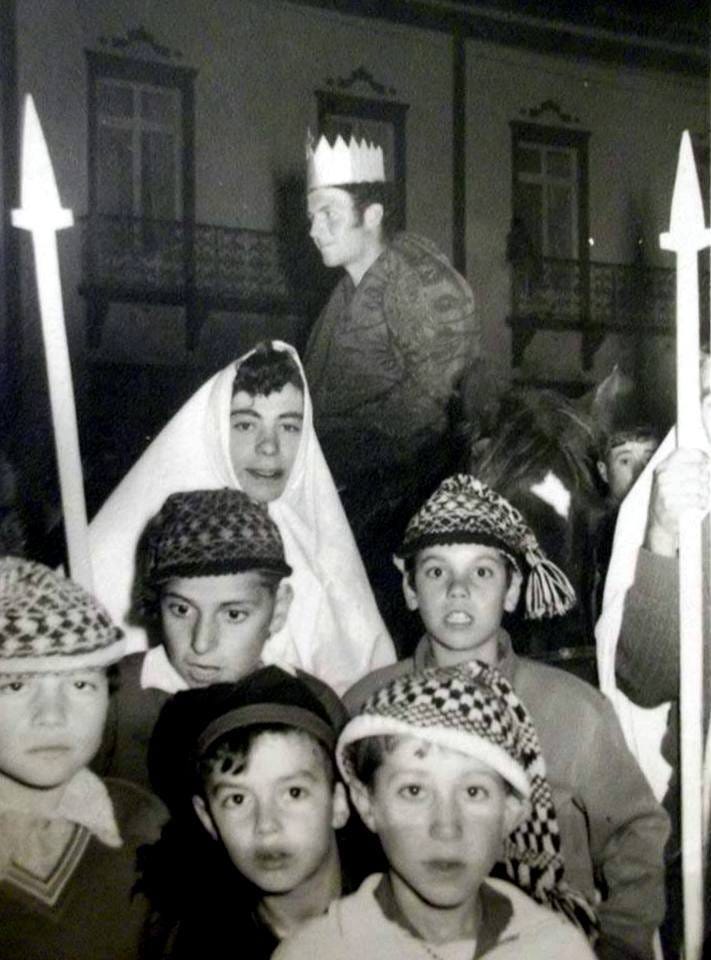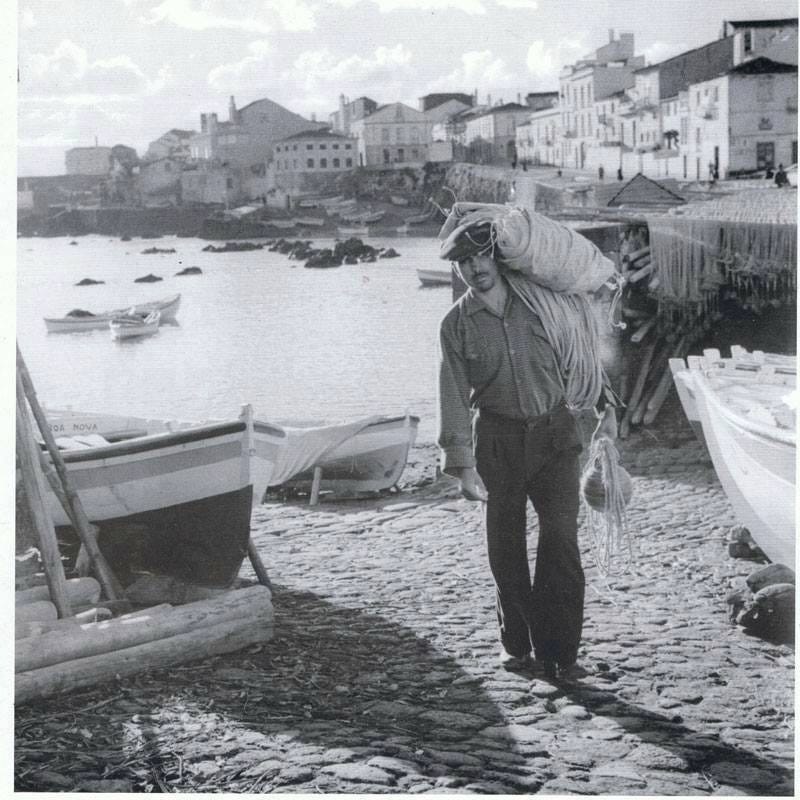
There is a rhythm to the way stories unfold in small villages—one that doesn’t rely on the traditional arcs of plot but instead on the cyclical rhythms of life, on repetition, and on the absurd. In Lomba da Maia, a tiny village tucked away behind the cliffs of São Miguel in the Azores, the stories I heard as a boy were as much about the names people carried as they were about the things they did. This village, a microcosm of the world, held within it a complex geography of familial ties, local histories, and shared identities. And in the way people were named—often through what seemed like accidental, humorous, or even cruel acts—there existed a narrative more profound than I could have imagined at the time.
As a child, I was enchanted by the legends of those who populated my family and the village, and in those early years, I didn’t realize that what I was witnessing was not just gossip but the very framework of human connection. Lomba da Maia had its own mythology, and at the heart of that mythology was a language of naming, of giving someone an apelido, a surname—or a nickname, that would stay with them forever. This naming convention was more than an identification—it was a mark, a memory, an inscription of a life lived and a life remembered. The apelidos I encountered, the stories behind them, and the figures who were attached to them, became the foundation of my fascination with storytelling. They were both a map and a mystery. To understand the geography of a person’s life in Lomba da Maia was to understand their nickname, their apelido, the stories that circled around them and stuck to their bones like glue.

One of the first such names that I heard and will never forget was of Eduarda, a woman from the village whose name was forever altered after an event that many saw as both tragic and comical. The story goes that, when Eduarda was a young girl, she swallowed a butterfly. Whether it was a moment of curiosity or simply misfortune, that butterfly lodged itself somewhere inside her. From that day forward, she became known as Eduarda Borboleta—Eduarda Butterfly. And this name, this tiny act of nature, would follow her for the rest of her life, a name that would resonate in every corner of the village. It was a nickname that, like all of the best ones, told a story—one of innocence, absurdity, and the unexpected magic of life.
But not all of the names were born out of whimsy. Some were born from mischief, and others from moments of sheer absurdity. Take, for example, Ricardo. Ricardo was a boy, much like any other, but his fate became sealed one fateful day when a dare led him into the jaws of misfortune. He was dared by some of the other boys to place a mousetrap close to his genitals, and, as often happens when dares meet youthful recklessness, the trap went off. The aftermath of that prank wasn’t just a painful lesson in caution—it was a rebranding of Ricardo himself. He was now, and forever would be, Ricardo Ratinho—Ricardo Little Mouse. The name was a permanent badge of his foolishness, but it was also something more. It was a symbol of the bond between the boys in the village, the pranks, the laughter, the rough edges of growing up. It was a name that served as both a reminder and a tribute, one that carried with it the weight of time and memory.
These names, these apelidos, were not fleeting—once they stuck to a person, they could follow them across generations. My maternal grandfather, for instance, was known as Mestre José Golochas. Mestre José made goloshes, wooden clogs. But his apelido was not just about his occupation; it was about the very image he created in the minds of those who passed through the village. It was how everyone could differentiate between my grandfather and the many other Josés in the village. His name would remain long after he was gone, a lingering whisper in the village’s collective memory. And though his occupation was humble, the name “Mestre” added a kind of reverence to it—he was a master of something, in this case, of wooden clogs.
Others in my family were not spared from the clutches of these apelidos, and, like so many of the names in Lomba da Maia, the stories that accompanied them were often wrapped in humor, irony, and sometimes embarrassment. My Aunt Candida, for instance, became Candida Mija na Lapa—Candida Piss on a Limpet. The story behind her name, I am told, came from an incident when she was seen squatting by Praia da Viola, relieving herself on the rocks. The scene, while ordinary in its own way, became something of a spectacle. Someone must have seen her, and in the small world of Lomba da Maia, a spectacle is all it takes for a name to be born. And so, Candida Mija na Lapa was born and would stick to her forever, like a permanent label that could not be peeled away. My Aunt Zélia’s family came from the backwoods of the village, a place where the earth seemed to be thick with untold stories. They were known as the Tarza family, a name inspired by the figure of Tarzan, the jungle hero. Whether this was a reference to their rugged, untamed way of life or a playful nod to the perceived wildness of their nature, I will never know. But the name stuck. Zélia, and the rest of her family, were marked with the name of a jungle hero, and like all of the best nicknames, it was a mix of affection and teasing. They were wild, yes, but they were also family.
What strikes me most about these names—these apelidos—is not just their absurdity or the humor they carried. It’s the way they serve as threads that connect people, not just to one another but also to the past. These names were not just marks on the body of a person; they were inscriptions that carried the stories of their lives, their mistakes, their embarrassments, and their triumphs. They were, in a way, a form of storytelling in their own right. In the case of Eduarda Borboleta or Ricardo Ratinho, their names were ways of remembering them—not just as isolated individuals but as integral parts of the fabric of the village. Their stories would be retold, passed down through generations, and their names would become synonymous with the very history of Lomba da Maia. These names, these apelidos, were the oral histories of the village—small, personal, and yet universal in their power to unite people across time.
The nicknames I grew up with, hearing them whispered or shouted across the village, have continued to live in me, both as part of my own family’s legacy and as a well of inspiration for my own writing. They have become the map by which I understand not only the people who were part of my world but also the way in which memory, humor, and history intersect in the lives of those who came before us. They taught me something essential about storytelling—that a name can carry more than just an identity; it can carry the weight of a life lived, a moment captured, a connection made.
As I sit here, writing this piece, I am reminded that these stories are not confined to the people of Lomba da Maia. They are universal, repeated in villages across the Azores, and beyond that, in communities across the world. Every village has its own mythologies, its own nicknames, its own stories that are passed down like family heirlooms. And these stories—these names—serve not just to differentiate but to connect us to one another, to the past, and to the very heart of what it means to be human. Writing fiction, for me, is a way of continuing that tradition—of capturing those moments, those names, those stories that stick to us like the apelidos we inherit from the villages that shaped us. It is through these names, these living legends, that I find my connection to the world. And it is through them that I will continue to write, to remember, and to honor the lives of those who came before me, and the people who continue to walk beside me.






Your story brings to memory my desire for a nickname - something I never got. There's an intimacy in the naming and a connection to people I missed growing up an only child.
I had a few chuckles reading about the apelidos....Thank you!
This resonates. In the town where I grew up in Flanders, a similar thing happened. You were known to be from so and so, who was born from so and so. And all this by their nicknames that stuck.